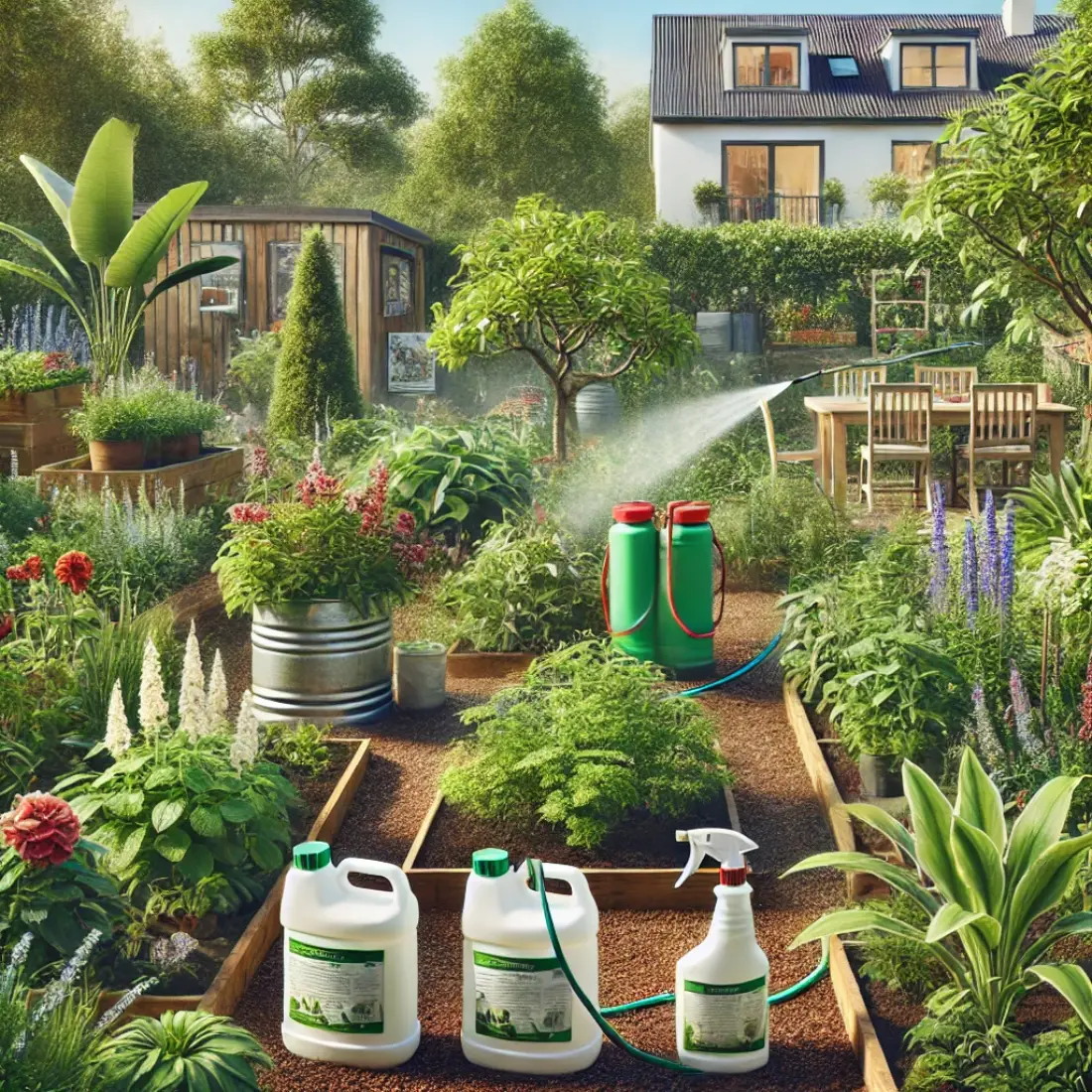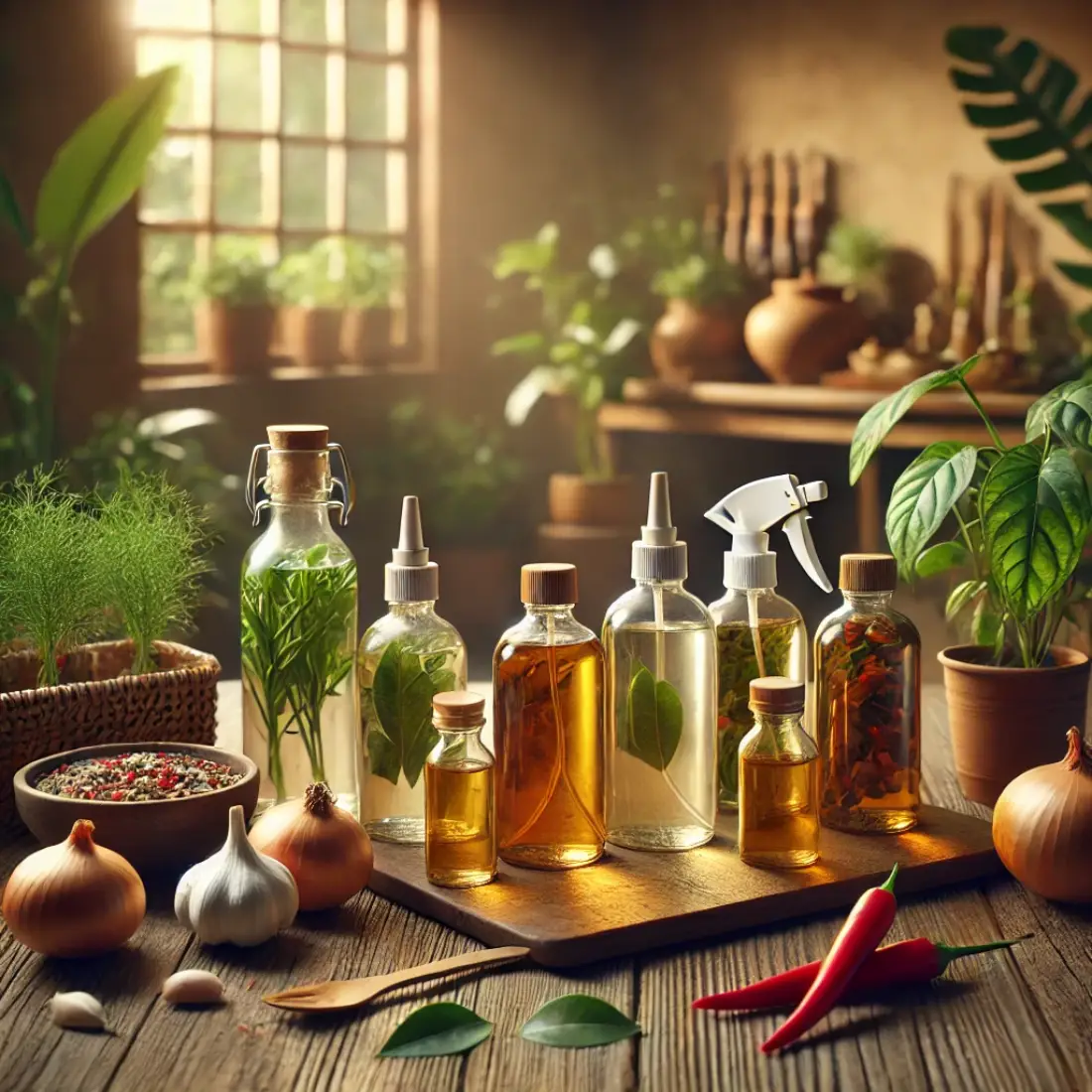Clove oil, derived from the clove tree (Syzygium aromaticum), has been valued for centuries due to its potent aroma and therapeutic properties. Chemical pesticides, herbicides, and fungicides, while effective, often pose risks to human health, beneficial insects, and the environment.
Clove oil offers a natural alternative, leveraging its powerful properties to combat pests, weeds, and plant diseases without the harmful side effects associated with synthetic chemicals.
From pest control to disease management, clove oil presents a holistic approach to maintaining a healthy and thriving garden, aligning with the growing movement towards organic and sustainable gardening practices.
Properties of Clove Oil
Antibacterial Properties
- Eugenol: The primary active ingredient in clove oil, eugenol, exhibits strong antibacterial activity, making it effective against a range of bacterial pathogens that can afflict garden plants.
- Other Compounds: Beta-caryophyllene and tannins also contribute to the oil’s antibacterial properties, enhancing its ability to protect plants from infections.
Antifungal Properties
- Fungicidal Effects: Eugenol disrupts the cell membranes of fungi, leading to their destruction. This makes clove oil an effective treatment for fungal infections such as powdery mildew and black spot.
- Broad-Spectrum Activity: Clove oil’s antifungal properties extend to various fungal species, providing a versatile tool for managing plant diseases.
Insecticidal Properties
- Insect Repellent: Clove oil is a natural insect repellent, deterring a wide range of pests including aphids, ants, beetles, and mites. Its strong scent and toxic effects on insects make it an effective, non-toxic alternative to chemical pesticides.
- Mode of Action: The oil’s compounds interfere with the nervous systems of insects, causing paralysis and death. This ensures effective pest control while minimizing harm to beneficial insects and pollinators.
Herbicidal Properties
- Weed Control: Clove oil has been found to possess herbicidal properties, making it useful for controlling unwanted weeds. When applied to the foliage of weeds, it causes desiccation and death of the plant tissue.
- Eco-Friendly: Unlike synthetic herbicides, clove oil breaks down quickly in the environment, reducing the risk of soil and water contamination.
Environmental Benefits
- Biodegradability: Clove oil is biodegradable, meaning it decomposes naturally without leaving harmful residues in the soil or water.
- Non-Toxic: Safe for use around humans and pets, clove oil does not pose the health risks associated with chemical garden products.
- Sustainable: As a plant-derived product, clove oil is a renewable resource, aligning with sustainable gardening practices.
Usage of Clove Oil in the Garden
Clove oil can be effectively used in various ways to enhance garden health and sustainability. Its natural properties make it a versatile tool for pest control, weed management, and disease prevention.
Insect Repellent
Clove oil is effective against a variety of garden pests such as aphids, ants, beetles, caterpillars, and mites.
Preparation of Clove Oil Spray:
- Mix 1 teaspoon of clove oil with 1 liter of water.
- Add a few drops of liquid soap to help the solution adhere to plant surfaces.
Application Methods:
- Spray the solution directly on plants, focusing on the undersides of leaves where pests tend to hide.
- Apply in the early morning or late evening to avoid leaf burn from sunlight.
- Reapply every 7-10 days or after heavy rain.
Herbicidal Properties
Clove oil can control broadleaf weeds and grasses.
How to Use Clove Oil as a Weed Killer:
- Mix 10-20% clove oil with water (for a stronger solution, use a higher concentration).
- Apply the solution directly to the leaves of weeds using a spray bottle.
- Ensure thorough coverage to maximize effectiveness.
Safety Precautions and Effectiveness:
- Avoid contact with desirable plants as it can harm them.
- Apply on a sunny day for better results as the heat enhances the oil’s effectiveness.
- Repeat application as needed to fully eradicate stubborn weeds.
Fungal and Bacterial Disease Control
Clove oil is useful in treating diseases like powdery mildew, downy mildew, and black spot.
Mixing and Applying Clove Oil Solutions:
- Mix 1-2 teaspoons of clove oil with 1 liter of water.
- Add a few drops of liquid soap to help the mixture adhere to the plant surfaces.
Preventative Measures:
- Regularly spray susceptible plants to prevent the onset of diseases.
- Ensure good garden hygiene by removing infected plant material and providing adequate spacing for air circulation.
Precautions and Considerations
Concentration and Dilution
- Proper Dilution Ratios: Always dilute clove oil appropriately to avoid damaging plants. Follow recommended ratios for different applications.
- Potential Risks of High Concentrations: High concentrations can cause phytotoxicity, leading to leaf burn or plant damage.
Application Frequency
- Recommended Intervals: Apply clove oil treatments at intervals of 7-10 days or as needed, depending on the severity of the issue.
- Signs of Over-Application: Watch for signs of plant stress or damage and adjust application frequency accordingly.
Plant Sensitivity
- Testing on Small Areas First: Before widespread application, test the solution on a small area of the plant to ensure it does not cause harm.
- Sensitive Plant Species to Avoid: Some plants may be more sensitive to clove oil. Research specific plant tolerances to avoid unintended damage.
FAQs about Using Clove Oil in the Garden
What is clove oil and where does it come from?
Clove oil is an essential oil extracted from the flower buds, leaves, and stems of the clove tree (Syzygium aromaticum). It is primarily composed of eugenol, which gives it its distinctive aroma and potent properties.
How does clove oil work as a pest control solution?
Clove oil acts as a natural insect repellent and insecticide. Its strong scent and chemical properties disrupt the nervous systems of insects, leading to paralysis and death, while repelling others.
Can I use clove oil on all my garden plants?
While clove oil is generally safe for many plants, it’s important to test it on a small area of the plant first. Some plants may be more sensitive to clove oil, so it’s best to start with a diluted solution and observe any adverse effects.
How do I prepare a clove oil spray for pest control?
To make a clove oil spray, mix 1 teaspoon of clove oil with 1 liter of water and add a few drops of liquid soap. This helps the solution adhere to plant surfaces. Spray the mixture directly on the plants, focusing on the undersides of leaves where pests often hide.
Is clove oil effective against all types of weeds?
Clove oil can be effective against a variety of broadleaf weeds and grasses. However, persistent weeds may require multiple applications. It works best when applied directly to the leaves on a sunny day, as the heat enhances its effectiveness.
How often should I apply clove oil treatments in my garden?
The frequency of application depends on the specific use. For pest control, it’s typically recommended to reapply every 7-10 days or after heavy rain. For weed control, reapply as needed to manage regrowth.
Are there any safety precautions I should take when using clove oil?
Yes, always dilute clove oil properly before use to avoid damaging plants. Wear gloves and avoid direct skin contact, as undiluted clove oil can cause irritation. Keep it away from children and pets when not in use.
Can clove oil be used to treat fungal diseases in plants?
Yes, clove oil has antifungal properties and can be used to treat fungal diseases like powdery mildew and black spot. Mix 1-2 teaspoons of clove oil with 1 liter of water, add a few drops of liquid soap, and spray the affected plants regularly.
What are the environmental benefits of using clove oil in the garden?
Clove oil is biodegradable and non-toxic to humans, pets, and beneficial insects. It breaks down naturally in the environment, reducing the risk of soil and water contamination compared to synthetic chemicals.
Where can I purchase clove oil for gardening purposes?
Clove oil can be purchased at health food stores, pharmacies, and online retailers. Ensure you are buying 100% pure clove oil without additives or synthetic ingredients for the best results in your garden.











